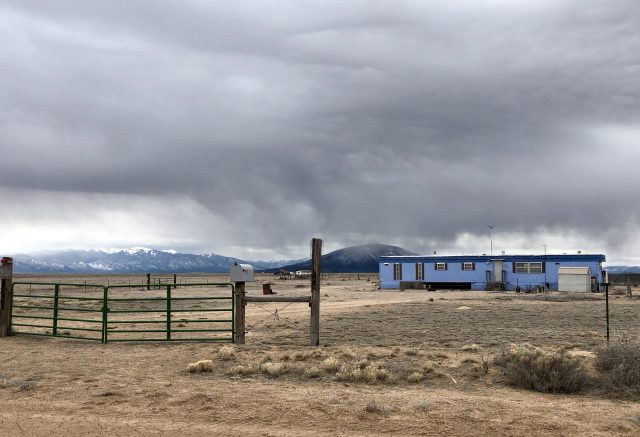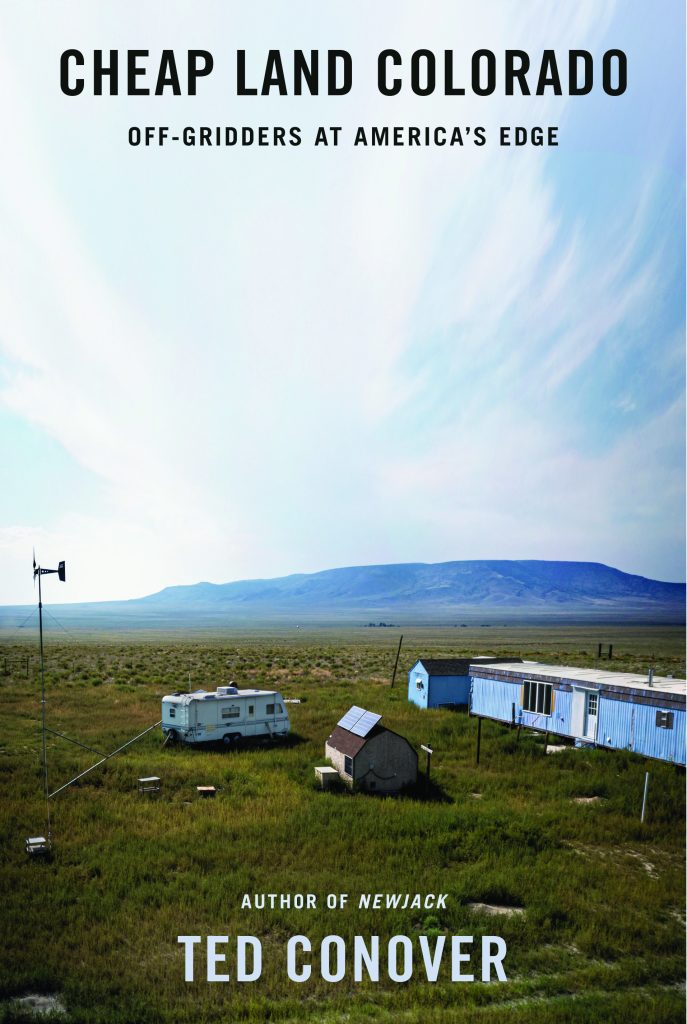
From working as a guard in Sing Sing prison to inspecting meat in a Nebraska beef plant, Ted Conover has taken on some difficult assignments in his long and decorated career as an immersive journalist.
But trying to live among and write about people who have intentionally moved as far away as they can from mainstream society, as Conover did for his new book Cheap Land Colorado: Off-Gridders at America’s Edge, required extra tact and finesse.
Over the course of four years, the former Denver resident and Pulitzer Prize finalist lived and worked on the plains of the San Luis Valley in the south-central region of the state, where people, for all manner of reasons, have come to stake their claims on $5,000, five-acre plots of land.
“It’s a very different world from the one most of us inhabit,” Conover says. “And it’s got a lot of people who are not looking to meet strangers.”
He highlighted the fact that a Google search of his name quickly shows he’s a journalist and a professor who lives in New York City, which is “three strikes to some people,” he says.
To gain favor and meet the people he wanted to write about, Conover volunteered for La Puente, a nonprofit organization that helps the poor. As part of his duties, he would deliver free firewood to people out on the prairie who lived in modular homes, ramshackle quarters often made out of RVs and other cobbled-together domiciles.
But his volunteer work alone didn’t cure the pervasive skepticism about another stranger coming to this harsh, unforgiving environment.
“On the prairie, people often resist getting to know new people until they’ve lasted at least one winter,” Conover says. That resistance is owed to a few reasons. A lot of people don’t make it that long, for one, and many underestimate how difficult it is to live in such a place and end up abusing the kindness of a helping hand.
“What you fear out there is your neighbor’s needs,” Conover says. “They [might] find themselves suffering and look to you for help.”

Buying in
As is typical of his work, Conover’s writing goes far deeper than the surface of the subject, mainly because he essentially became one of the 1,000 or so people living on the five-acre plots of land between the Sangre de Cristo and the San Juan mountains near Alamosa. He went as far as buying a place to live, which he still owns.
“My project was to understand life on the flats, and ownership was a major part of that,” he writes in the book. “I could interview a hundred landowners (and probably had), but it seemed to me I’d understand them all better if I were an owner.”
In a way similar to Jessica Bruder’s 2017 book Nomadland: Surviving America in the Twenty-First Century, which was made into an Academy Award-winning movie, Cheap Land Colorado ends up saying as much about American society as it does about the individual lives it depicts.
“You can definitely see that the presence of some people out there points to our failure as a country to offer other paths for low-income people,” Conover says. “[Many] have been through various kinds of trauma, whether it’s military service, or losing their house, falling under an addiction that has cost them their dearest friends and relatives … I’m not saying America is responsible for all of this, but somehow we produce a lot of people who don’t fit in.”
Leaving society
Another set of people Conover depicts are those who simply came to leave urban life behind.
“Generally speaking, the flats residents I met were not the young and idealistic (though there were exceptions),” he writes. “Rather, they were the restless and the fugitive; the idle and the addicted; and the generally disaffected, the ‘done with what we’re supposed to do’ crowd. People who, feeling chewed up and spit out, had turned away from and sometimes against institutions they’d been involved with all of their lives, whether companies or schools or the church. The prairie was their sanctuary and their place of exile.”
That’s not to say the entire picture he paints is bleak, though the poverty and the lack of job opportunities, health care and quality education can be grim. Despite that, Conover notes that the land and the sky and the weather are all romantic and beautiful, and these people had chosen to come live there, difficulties be damned. “That added something hopeful to the whole equation,” he writes.
Making a life out there does have its positives for some families, as Conover puts it. One family, for example, wasn’t getting by with dad painting houses in Greeley and mom taking care of three kids. So they figured they would reduce their needs and live in a trailer out on the prairie.
“They live hand to mouth, but they will tell you this is where they want to be and they wouldn’t want to live somewhere else,” Conover says. “They might wish they had more of a padding for when the truck breaks down. And when [dad] gets sent to the hospital in Denver because of blood clots in his leg. But they seem, on balance, to be glad they’re there.”
For someone in Boulder reading this thinking they want to head south for some cheap land, Conover suggests they consider the whole picture.
“The upsides are pretty clear,” he says. “The land is cheap. For much of the year, the weather is nice. But they should consider the downsides, which is that if you don’t stay there, for the rest of your lives, things you might leave on your property might not be secure, like building materials or anything.”
Conover says whole RVs can disappear while people are away because of the needs of their neighbors. And selling the land might be impossible because there’s an oversupply of five-acre lots.
“That’s the wrench in this frontier dream,” he adds. “It may not make financial sense. It’s not a great investment. It’s an easy way to lose money. But the startup costs are low.”
ON THE SHELF: Cheap Land Colorado: Off-Gridders at America’s Edge is available now via Penguin Random House.














